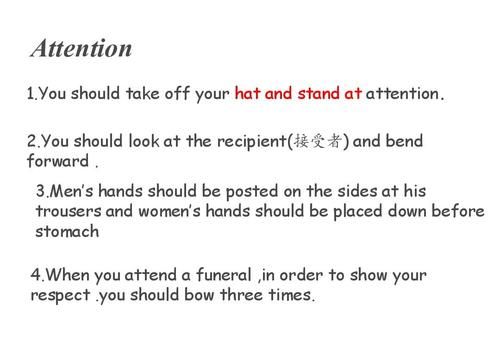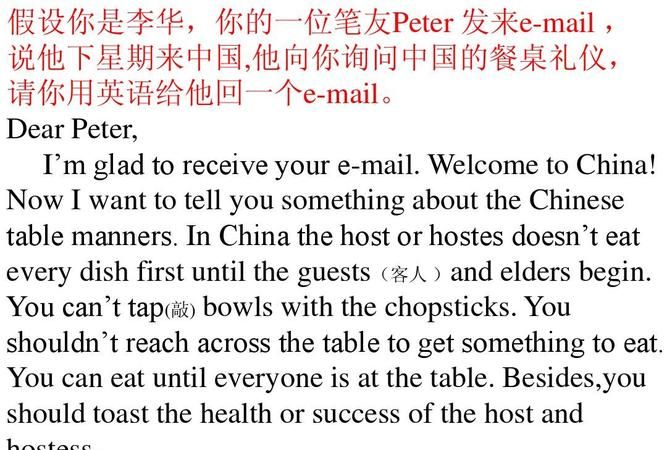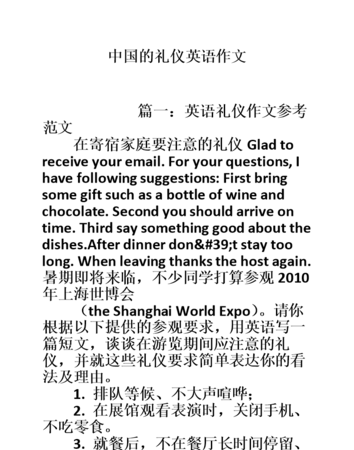本文目录
向外国笔友介绍中国餐桌礼仪英语作文带翻译
China Dining Custom
Table Manners
The main difference between Chinese and western eating habits is that unlike the West, where everyone has their own plate of food, in China the dishes are placed on the table and everybody shares. If you are being treated by a Chinese host, be prepared for a ton of food. Chinese are very proud of their culture of cuisine and will do their best to show their hospitality.
And sometimes the Chinese host use their chopsticks to put food in your bowl or plate. This is a sign of politeness. The appropriate thing to do would be to eat the whatever-it-is and say how yummy it is. If you feel uncomfortable with this, you can just say a polite thank you and leave the food there.
Eating No-no's
Don't stick your chopsticks upright in the rice bowl.Instead,lay them on your dish. The reason for this is that when somebody dies,the shrine to them contains a bowl of sand or rice with two sticks of incense stuck upright in it. So if you stick your chopsticks in the rice bowl, it looks like this shrine and is equivalent to wishing death upon a person at the table!
Make sure the spout of the teapot is not facing anyone. It is impolite to set the teapot down where the spout is facing towards somebody. The spout should always be directed to where nobody is sitting, usually just outward from the table.
Don't tap on your bowl with your chopsticks.Beggars tap on their bowls, so this is not polite.Also, when the food is coming too slow in a restarant, people will tap their bowls. If you are in someone's home,it is like insulting the cook.
Drinking
Gan Bei! (Cheers! “Gan Bei” literally means “dry [the] glass”) Besides beer, the official Chinese alcoholic beverage is Bai Jiu,high-proof Chinese liquor made from assorted grains. There are varying degrees of Bai Jiu. The Beijing favorite is called Er Guo Tou, which is a whopping 56% alcohol. More expensive are Maotai and Wuliangye
Chinese table manners
Chinese table manners of families have no intrinsic quality even there are different region and position. No matter three meals a day or guest’s arrival, always bowls with chopsticks, food with soup. There is no rule for how to put the tableware. What people care about more are not the gorgeous tableware but the sumptuous food. People’s dining position reflects the most obvious etiquette of Chinese table manners. In ancient society, men are supreme, and women are not allowed to sit with men on the same table. Although this is modern society, this kind of ancient etiquette still remains. Today in China, the phenomenon that men sit on the table before women can be found everywhere. The master of a family usually sits on the first-class seat. The first-class seat is usually near the interior of a room facing to the door. Once there is a guest, the master will offer the first-class seat to the guest politely. If it is an ordinary meal of family, families should start after the elder. If there is a guest, the master offer the food to the guest is essential from the beginning to the end. And the tradition of urging others to drink is also a special phenomenon.
Even there is no official “table manners’ in china, while there is “eating behavior”. Once there is “eating behavior”, there must be some eating manners up to standard.
Here are some characteristics on Chinese eating:
a. Keep your eyes on the meal, especially at the beginning of the meal.
b. When eating, keep your bodies forward, and face to your food.
c. It is allowed to spit the bone on the tables.
d. When chewing, it is allowed to make some rhythmical noisy of chewing.
e. Traditional Chinese meal doesn’t need the public chopsticks.
f. Traditional Chinese meal doesn’t have the sweet snacks after meal.

高分中国见面时的问候方式、对赞美的回答方式、接收礼物的回映方式、餐宴礼节这些内容写篇英语作文
Dear Mr.x,
Thank you very much for hosting such a wonderful dinner party and inviting me to come along.
I thoroughly enjoyed meeting so many new friends during the party and must have spent the most memorable evening in my life there. Your hospitality is far too heart-felt and I must congratulate you for being such an excellent host.
I look forward to repaying this generosity of yours in the not too distant future.
With warm regards,
yy
收到礼物后的感谢信

介绍中国谈话礼节的英语作文带翻译
面子/Mianzi (Face)
The idea of shame, usually expressed as 'face' could be loosely defined as the 'status' or 'self-respect' in Chinese and by no means alien to foreigners. It is the worst thing for a Chinese to lose face. Never insult, embarrass, shame, yell at or otherwise demean a person. Since all these actions would risk putting a Chinese in a situation that he might lose face. Neither try to prove someone wrong nor shout at him in public. In order to get a successful effect without letting a Chinese lose face, any criticism should be delivered privately, discreetly and tactfully, or else, just opposite to what you wish.
羞耻这个概念,通常被表达为“面子”。在中文中大致的含义是“地位”或者“自尊”,这和外国人的观念并不相同。在中国,最糟糕的事莫过于失了面子。所以,千万不要对一个人进行侮辱、羞辱或者对其大吼,让其尴尬等。因为这样会让一个中国人感觉到失了面子。千万不要证明某人错了,或者在公共场合对其吼叫。为了能有效的传达意见而不让中国人丢了面子,任何的批评都应该私下传递,而且方式要巧妙而谨慎。否则,你将事与愿违。
关系/Guanxi (Relationships between People)
Throughout much of Chinese history, the fundamental glue that has held society together is the concept of guanxi, relationships between people. It is very important for the Chinese to have good relationships. They often regard good social relations as a symbol of personal ability and influence. Someone who has no connections would be despised and is only half-Chinese.
纵贯中国的历史,一个维系社会的基本粘合剂就是关系这个概念,也就是人与人之间的关联。对中国人来说,有良好的关系是十分重要的。他们往往将拥有良好的社会关系看成是一个人能力和影响力的象征。一个毫无关系的人将会被轻视,而且最多只能算半个中国人。
客气/Keqi
Keqi not only means considerate, polite, and well mannered, but also represents humbleness and modesty. It is impolite to be arrogant and brag about oneself or one's inner circle. The expression is most often used in the negative, as in buyao keqi, meaning "you shouldn't be so kind and polite to me," or "you're welcome."
客气并不只是包含考虑周详、礼貌文雅和举止端详,还表现在谦逊和谨慎。对自己或者自己的圈内人表达的傲慢或者自夸都是不礼貌的。表达的时候,通常要以否定的形式,比如“不要客气”,意思是说“你不必对我这么关心、礼貌”或“不用谢”。
Besides, Chinese seldom express what they think directly and they prefer a roundabout way. Neither show their emotions and feelings in public. They rarely greet people with a handshake, though it is very popular among foreigners, say nothing of embracing or kissing when greeting or saying good-bye. Consequently, it is better not to behave too carefree in public, even though you are well-intentioned. Also, it is advisable to be fairly cautious in political discussions. Do not particularly push yourself forward, or else you are unwelcome.
此外,中国人很少直接表达自己的想法,而喜欢用侧敲旁击的方式。从不在公共场合表现自己的情绪或者感觉。尽管在西方握手的见面礼非常普遍,但在中国这样做的人还不是很多,更不用说见面和道别时的拥抱和亲吻了。因此,即使你是出于好意,在公共场合也不要表现的太自由自在。同样,在政治话题上保持相对慎重也是明智的。不要太特立独行,否则你将会是不受欢迎的。

用英语介绍中国的见面礼仪
As we all know,different countries have different table manners. Today, I’d like to introduce something about Chinese table manners. It’s very necessary to learn table manners in China. In China, table manners are too much. For instance,you are not supposed to eat with knives and forks. Chinese usually use chopsticks instead. But we are not supposed to stick our chopsticks into our food. But we are supposed to pick up our bowl to eat. And we are supposed to let the old start eating first. And we are allowed to talk at the table. However, you can’t talk too loud and laugh too crazily. In fact, in China, table manners are not so serious . so , you don’t need to worry about them so much.

以上就是关于中国见面礼仪英语作文 ,向外国笔友介绍中国餐桌礼仪英语作文带翻译的全部内容,以及中国见面礼仪英语作文 的相关内容,希望能够帮到您。

